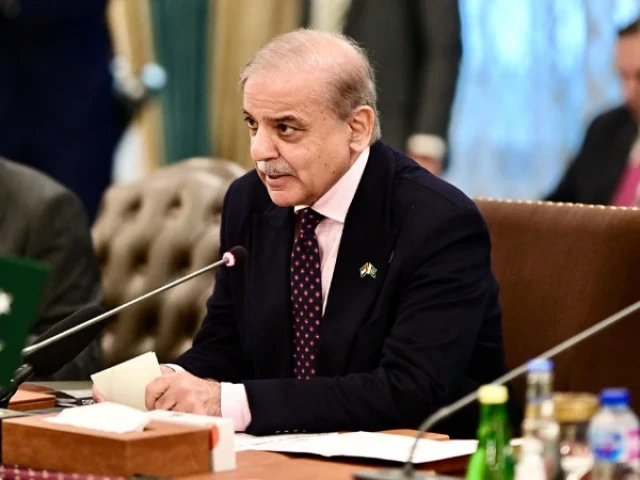Meeting in the Prime Minister’s Chamber to finalize strategy before the National Assembly vote on November 14
Prime Minister Shehbaz Sharif will meet leaders of allied parties at the Prime Minister House today to discuss the 27th Constitutional Amendment, giving confidence to coalition partners during a major consultation session scheduled for this afternoon.
The decision was made for the National Assembly to approve the 27th Constitutional Amendment on November 14. In this regard, the Prime Minister will hold consultations with allied parties and all foreign visits by ministers and parliamentarians have been cancelled.
Furthermore, the Speaker of the National Assembly has consulted with the parliamentary leaders of all parties and the agenda and schedule of the assembly session have been approved. However, Pakistan Tehreek-e-Insaf (PTI) parliamentary leaders did not attend the meeting.
Read: 27th Amendment: What we know so far
Yesterday, opposition lawmakers came out in full force in the National Assembly against the proposed 27th Constitutional Amendment, which has caused a political storm in the country at a time when the apex court is already busy with petitions challenging the 26th Amendment.
Speaking in the lower house of parliament, PTI chairman Barrister Gohar Ali Khan denounced the proposed new changes to the 1973 Constitution as “an attack on the House”, and vowed that his party would continue to raise its voice against the move.
Recalling the events surrounding the passage of the 26th Amendment, Gohar said the PTI, along with JUI-F chief Maulana Fazlur Rehman, had made “great efforts” to block it.
“Perhaps this time we will not need to visit his (Fazl’s) residence or sit with you in a committee,” he said, addressing directly the vice president presiding over the session. “We will raise our voice against this as it is an attack on the House,” he added.
Read more: Vawda meets with Fazl as 27th Amendment talks accelerate
“Whenever there is a constitutional amendment anywhere in the world, it is done by consensus and according to the needs of the country,” the PTI president said.
What we know so far
The capital is abuzz with political frenzy as the much-debated 27th Constitutional Amendment is about to be introduced in the Senate this Friday.
As the Pakistan People’s Party (PPP) prepares to address the issue during its executive committee meeting scheduled for tomorrow, two questions seem to dominate all circles: what will the final draft of the Amendment contain and is it realistic to achieve its approval, given the fragile coalition underpinning the current parliamentary structure?
Deliberations on the 27th Amendment began shortly after the 26thth The Constitutional Amendment was passed in October 2024. However, until now, no one could say with certainty what it would entail. On Monday, PPP president Bilawal Bhutto-Zardari gave the first indication of what a post on X will entail.
According to Bilawal’s tweet, the 27th Amendment aims to further reform the judiciary, building on the changes brought in the 26th Amendment. It proposes the establishment of federal constitutional courts in the provinces, the restoration of executive magistrates and the transfer of powers to allow judges to move between jurisdictions.
Bilawal revealed that a delegation of Pakistan Muslim League-Nawaz (PML-N), led by Prime Minister Shehbaz, met President Asif Ali Zardari and himself to seek PPP’s support for passing the Amendment.
Much now depends on the outcome of the PPP Central Executive Committee meeting, which is expected to determine the party’s final position.
Also read: Shehbaz led PML-N delegation approached PPP to support 27th Amendment: Bilawal
the senate
Currently, 64 votes are needed in the Senate to pass any constitutional amendment. The PPP has 26 seats, making it the most dominant party in government seats, while the PML-N has 20.
Among the coalition partners, the Balochistan Awami Party (BAP) has four members and the Muttahida Qaumi Movement (MQM) has three. Independent senators on the government side include Abdul Karim, Abdul Qadir, Mohsin Naqvi, Anwaar-ul-Haq Kakar, Asad Qasim and Faisal Vawda.
In the opposition seats, Pakistan Tehreek-e-Insaf (PTI) remains the largest party, with 14 seats, and a newly elected senator is expected to be sworn in soon. The Awami National Party (ANP) has three seats, while Jamiat Ulema-e-Islam (JUI-F) has seven. The Majlis Wahdat-e-Muslimeen (MWM) and the Sunni Ittehad Council (SIC) have one senator each.
The PTI has unequivocally stated that it will not support the 27th Amendment. The Tehreek Tahafuz-e-Aeen-e-Pakistan (TTAP) has announced plans to block all attempts to secure its passage.
Former National Assembly Speaker Asad Qaiser criticized the PPP’s stance, saying: “There was once a PPP of Zulfikar Ali Bhutto, who laid the foundation of the Constitution, and another of Benazir Bhutto, who sacrificed her life for democracy. But today’s PPP is working hard to bury democracy.”
The final step
Once the draft amendments are finalized in the Senate, it will go to the National Assembly for voting.
The government alliance may have a two-thirds majority in Parliament, but without the support of the Pakistan People’s Party (PPP), the passage of the 27th Constitutional Amendment remains uncertain. So what is the party’s current position in the National Assembly and how many votes are needed to pass the amendment?
The National Assembly is made up of 336 members, but with 10 seats currently vacant, the total number of sitting members rises to 326. To pass a constitutional amendment, the ruling coalition requires the “golden figure” of 224 votes.




